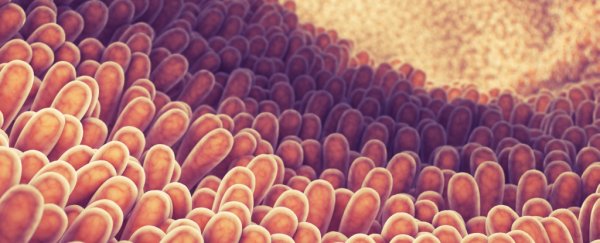The role played by the millions of bacteria that live in our intestines is poorly understood, but the more we learn, the more complex it gets.
And, according to two new studies out this week, this microbiome could play a more significant part in multiple sclerosis than we thought.
Multiple sclerosis, which affects 2.5 million people around the world, is thought to be an autoimmune disease. During a relapse, or attack, immune cells breach the blood-brain barrier and enter the central nervous system, something that is highly restricted in healthy people.
These immune cells then attack the protective coating around nerve cells. This causes inflammation in the brain, which in turn causes scarring. These scars are responsible for the physical symptoms of MS.
No one knows what causes it, but a growing body of research is connecting it to the gut microbiome.
Several previous studies have identified microbiome differences between MS patients and healthy people, but new studies by teams at the University of California, San Francisco and the Max Planck Institute of Neurobiology in Germany have identified how the different gut microbiome may play a role.
In the University of California study, led by geneticist Sergio Baranzini, two genera of bacteria, Acinetobacter and Akkermansia, were found to be four times more abundant in MS patients than healthy people.
They also showed that a genus of bacterium called Parabacteroides is four times more abundant in healthy people than MS patients.
Previous studies had already shown that Acinetobacter and Akkermansia were more abundant in MS patients, and Parabacteroides more abundant in healthy people.
Baranzini's team wasn't simply trying to identify microbiome differences. They were trying to see what those differences mean. So they put a type of immune cell that transforms based on the threat it encounters in contact with Acinetobacter and Akkermansia.
These cells transformed into a type of T helper cells, which trigger inflammation as a mechanism for fighting infection. Moreover, Acinetobacter slowed the production of regulatory T cells, which suppress the immune response.
These regulatory T cells are very helpful for autoimmune patients, so limiting their production while accelerating production of cells that cause inflammation could exacerbate relapses.
To observe this, they transferred the bacteria to healthy mice and induced brain inflammation. Within 20 days, the mice had developed severe brain inflammation, compared to mice who had had gut bacteria transferred from healthy people. These control mice "didn't get nearly as sick," Baranzini said.
The second study, led by Gurumoorthy Krishnamoorthy and Hartmut Wekerle, looked at 34 sets of identical twins between the ages of 21 and 63, where only one twin had developed MS.
Again, they found that Akkermansia was more abundant in the twins with MS.
The took the microbiome from each of the 68 twins and transplanted them into mice predisposed to develop an autoimmune disease similar to MS.
After 12 weeks, they found mice transplanted with the MS twins' microbiome were three times more likely to develop a brain inflammation than those who were transplanted with the healthy microbiome.
Both studies had small sample sizes, and, Baranzini notes, it's too early to be thinking about potential treatments based on the information. However, both studies demonstrate that there is more to be learned from studying the microbiome in relation to multiple sclerosis.
"Our results," the University of California researchers wrote in their paper, "expand the knowledge of the microbial regulation of immunity and may provide a basis for the development of microbiome-based therapeutics in autoimmune diseases."
